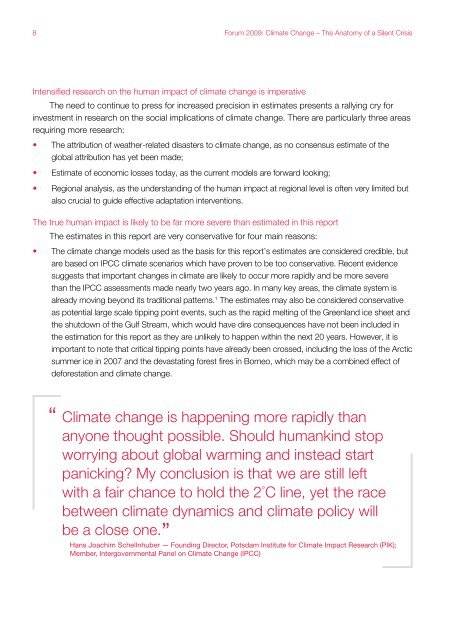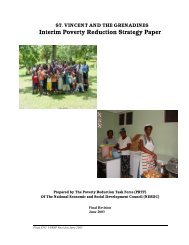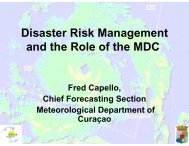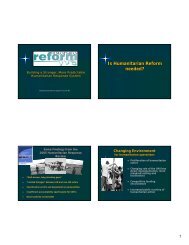The Anatomy of A Silent Crisis The Anatomy of A Silent Crisis
The Anatomy of A Silent Crisis The Anatomy of A Silent Crisis
The Anatomy of A Silent Crisis The Anatomy of A Silent Crisis
- TAGS
- anatomy
- www.bb.undp.org
Create successful ePaper yourself
Turn your PDF publications into a flip-book with our unique Google optimized e-Paper software.
8 Forum 2009: Climate Change – <strong>The</strong> <strong>Anatomy</strong> <strong>of</strong> a <strong>Silent</strong> <strong>Crisis</strong><br />
Intensified research on the human impact <strong>of</strong> climate change is imperative<br />
<strong>The</strong> need to continue to press for increased precision in estimates presents a rallying cry for<br />
investment in research on the social implications <strong>of</strong> climate change. <strong>The</strong>re are particularly three areas<br />
requiring more research:<br />
• <strong>The</strong> attribution <strong>of</strong> weather-related disasters to climate change, as no consensus estimate <strong>of</strong> the<br />
global attribution has yet been made;<br />
• Estimate <strong>of</strong> economic losses today, as the current models are forward looking;<br />
• Regional analysis, as the understanding <strong>of</strong> the human impact at regional level is <strong>of</strong>ten very limited but<br />
also crucial to guide effective adaptation interventions.<br />
<strong>The</strong> true human impact is likely to be far more severe than estimated in this report<br />
<strong>The</strong> estimates in this report are very conservative for four main reasons:<br />
• <strong>The</strong> climate change models used as the basis for this report’s estimates are considered credible, but<br />
are based on IPCC climate scenarios which have proven to be too conservative. Recent evidence<br />
suggests that important changes in climate are likely to occur more rapidly and be more severe<br />
than the IPCC assessments made nearly two years ago. In many key areas, the climate system is<br />
already moving beyond its traditional patterns. 1 <strong>The</strong> estimates may also be considered conservative<br />
as potential large scale tipping point events, such as the rapid melting <strong>of</strong> the Greenland ice sheet and<br />
the shutdown <strong>of</strong> the Gulf Stream, which would have dire consequences have not been included in<br />
the estimation for this report as they are unlikely to happen within the next 20 years. However, it is<br />
important to note that critical tipping points have already been crossed, including the loss <strong>of</strong> the Arctic<br />
summer ice in 2007 and the devastating forest fires in Borneo, which may be a combined effect <strong>of</strong><br />
deforestation and climate change.<br />
“ Climate change is happening more rapidly than<br />
anyone thought possible. Should humankind stop<br />
worrying about global warming and instead start<br />
panicking? My conclusion is that we are still left<br />
with a fair chance to hold the 2 ° C line, yet the race<br />
between climate dynamics and climate policy will<br />
be a close one.”<br />
Hans Joachim Schellnhuber — Founding Director, Potsdam Institute for Climate Impact Research (PIK);<br />
Member, Intergovernmental Panel on Climate Change (IPCC)







